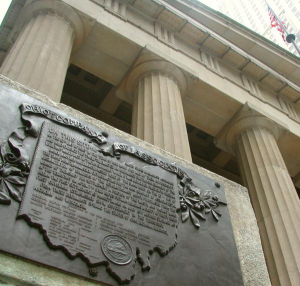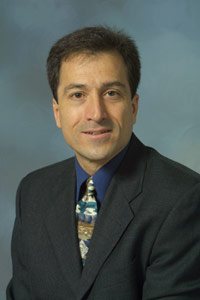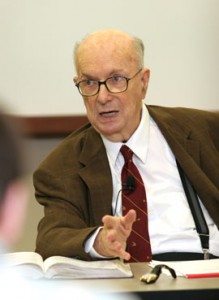Parking Garage Quietly Marks the 225th Anniversary of the Northwest Ordinance
 This post is authored by J. Gordon Hylton and Jane Casper.
This post is authored by J. Gordon Hylton and Jane Casper.
July 13, 2012 marked the 225th anniversary of the signing of the Northwest Ordinance.
As some users of the Eckstein Hall Parking Garage know, excerpts from the text of the 1787 Northwest Ordinance are transposed on the walls of the Tory Hill/Clybourn Street floor of the garage and on the elevator doors on the same level. (The Magna Charta excerpts are on the walls of the underground garage’s other level.)
The Northwest Ordinance was one of the first landmarks of constitutional government in the United States. It “organized” the Northwest Territory, the first United States territory, and it set down a series of guidelines that would dramatically affect the development of the “western” United States.
The Northwest Territory included the present day states of Ohio, Indiana, Illinois, Michigan, Wisconsin, and part of Minnesota, and its passage was made possible by the willingness of eastern states, particularly Virginia, to cede their western land claims to the national government.
The Ordinance dictated that new states would be created from the Territory when the population warranted; it abolished African-American slavery in the region during the territorial stage; it propagated the first bill of rights issued by the United States government; it committed the policy of the United States to the support of public schools (and religion generally); and it established the “gridded township” system of development advocated by Thomas Jefferson that defines to political organization of states like Wisconsin to this very day.
At the same time the Congress was enacting the Northwest Ordinance in New York City, our so-called “Founding Fathers” were meeting in Philadelphia and were in the process of drafting the Constitution that would replace the Articles of Confederation. That the Northwest Ordinance was unaffected by the ratification of the new Constitution was confirmed on August 7, 1789, when new President George Washington signed into law a re-enacted Northwest Ordinance (which contained only minor alterations).
Plans are in the works for a festive event in the summer of 2014 to celebrate the 225th anniversary of the signing of the re-enacted Ordinance.


